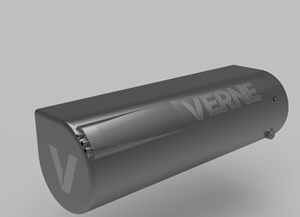News
Verne receives award to develop cryo-compressed H2 solutions for the U.S. Army
Verne received an award to research cryo-compressed hydrogen (CcH2) vehicles for the U.S. Army. H2 is an alternative fuel that can be generated onsite near the edge of operations, removing reliance on complex fuel supply chains and lowering all-in fuel costs. Cryo-compressed H2 is a novel form of H2 storage that maximizes H2 density, extending vehicle range without adding extra weight. During this project, Verne will work with the U.S. Army Ground Vehicle System Center and vehicle manufacturers to gather requirements and model the operational impact of adopting CcH2 solutions for medium and heavy-duty vehicles used in U.S. Army operations.
The U.S. military is the largest consumer of oil in the world, using more than 100 MMbpy of oil. In 2021, the U.S. military emitted 51 MM metric t of CO2, greater than the total emission footprint of more than 70% of countries. However, the U.S. military has placed a strong emphasis on decarbonizing their operations: the U.S. Army released their first comprehensive Climate Strategy in 2022, with the goal of reaching net zero emissions from Army installations by 2045. Investing in clean energy research will enable the U.S. Army to achieve these climate targets, develop supply chain resiliency, and remain at the cutting edge of important frontier technologies like CcH2.
The U.S. Department of Defense has long been a leading driver of innovation, responsible for developing critical technologies with benefits extending far beyond military applications. The U.S. Department of Defense drove early semiconductor development in the 1950s, created the precursor to the modern internet in the 1960s and built the first Global Position System (GPS) in the 1970s. The U.S. Department of Defense is now leading development of alternative energy technologies to increase operational capabilities and meet their energy targets.
Verne’s cryo-compressed H2 technology involves cooling and compressing H2 to achieve the maximum H2 density at 73 g/L internal density, a 33% improvement over liquid H2 and an 87% improvement over traditional 700 bar compressed gas H2. This best-in-class energy density leads to greater range and payload, enhancing operational capabilities.
“The U.S. Army has been responsible for advancing many critical technologies and Verne is excited to work together to advance cryo-compressed H2,” said David Jaramillo, Verne Co-founder and CTO. “Verne’s mission is to provide zero-emission technologies that do not require costly performance trade-offs, and this is a vote of confidence that the U.S. Army believes CcH2 can meet their strict performance standards.”
Decisive Point, a venture capital firm with expertise in navigating the federal and commercial markets will provide strategic support on this award: “The DoD continues to fund technologies that enable its platforms to leverage new fuel sources like H2 to provide an advantage when it comes to resilient supply chains and long-range capability,” said Eric Horan, Partner at Decisive Point and former Government Contracting Officer for the U.S. Navy.


